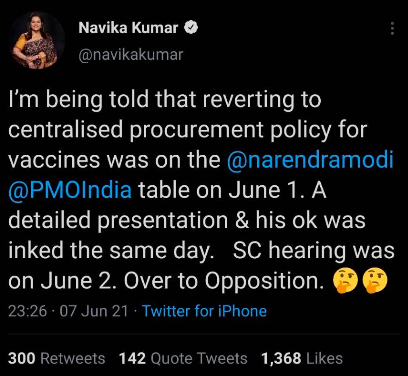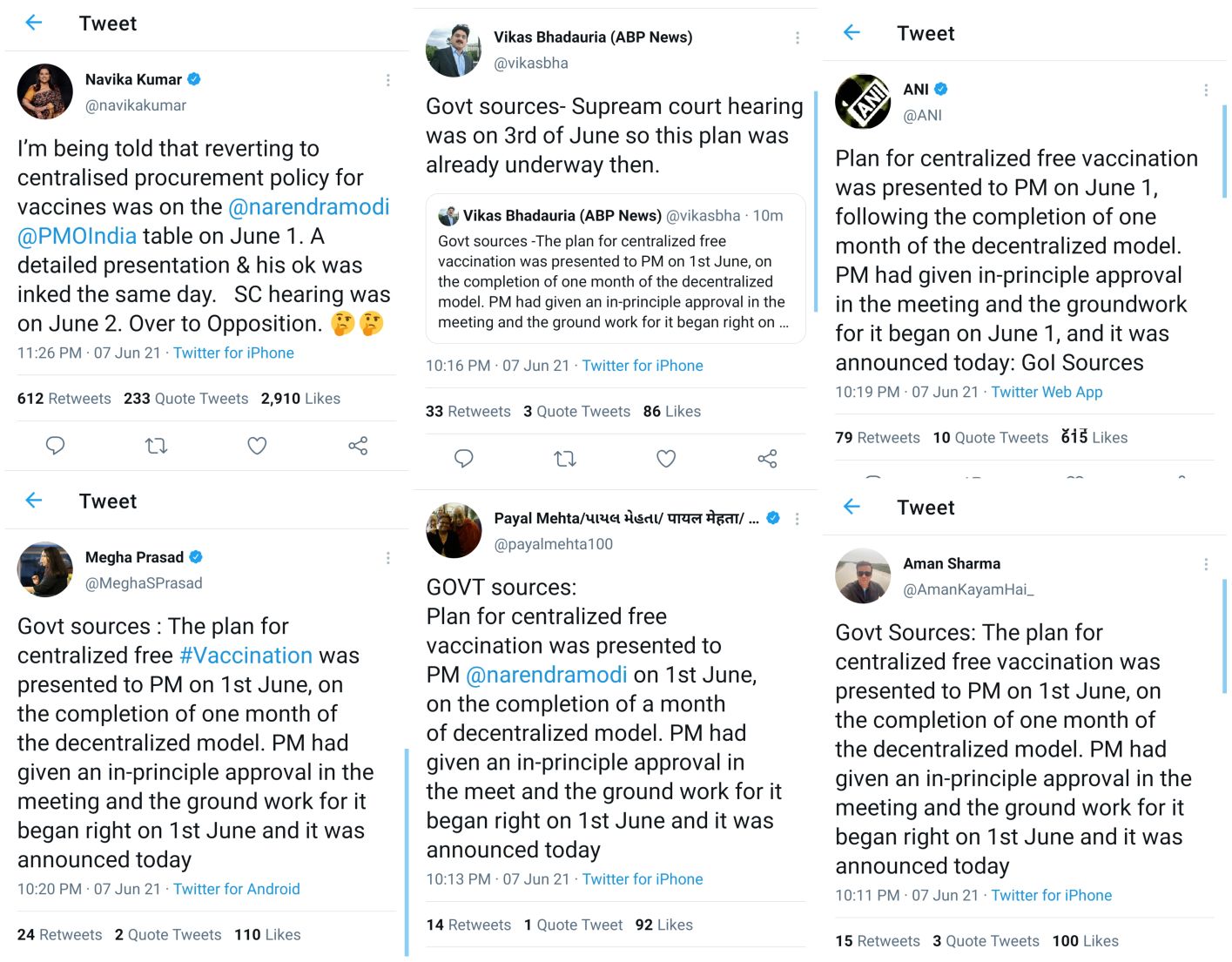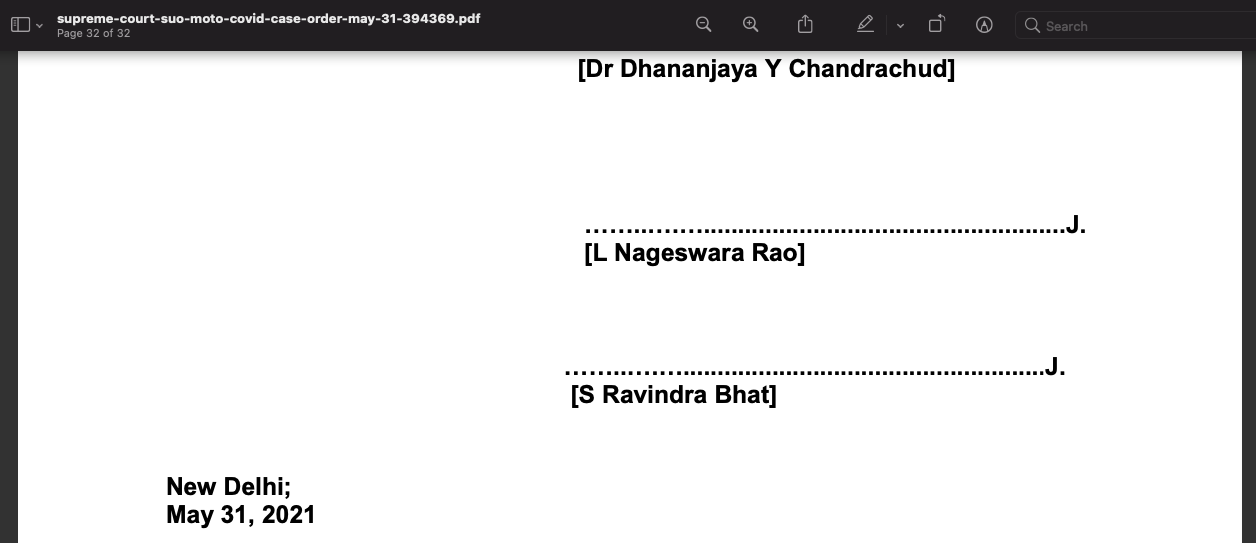Since January, the COVID-19 vaccination drive in India has been taking place in three phases. The third phase began on May 1 for adults aged between 18 to 44. PM Modi had directed states on April 19 to procure vaccines to begin this phase. In April itself, the Supreme Court had criticised the Centre's policy in a suo motu case. On June 7, the Prime Minister announced that the Centre will now directly procure 75% of the vaccines and provide free vaccination to everyone above 18.
Subsequently, several journalists and mainstream media outlets portrayed that the union government's plan to revert to centralised procurement of vaccines was tabled on June 1 and the Supreme Court order hearing came out on June 2 – thus implying that PM Modi's announcement was an independent decision and the Supreme Court's observations had no bearing.
Times Now editor Navika Kumar wrote, "I'm being told that reverting to centralised procurement policy for vaccines was on the @narendramodi @PMOTable on June 1. As a detailed presentation & his ok was inked the same day. SC hearing was on June 2. Over to opposition." She later took down her tweet.

ABP News anchor Vikas Bhadauria cited "govt sources", claiming the centre's plan was "already underway" by the time the SC's hearing was held on "June 3". An identical tweet that cited "govt sources" for the information was posted by numerous other journalists including Aman Sharma, Payal Mehta and Megha Prasad.

Republic reported, "However, top sources in the Government of India have rebutted the claims of the Opposition by stating that the plan for Centralised free vaccinations was presented to PM Modi on June 1. The Prime Minister had given approval on the same day, whereas the Supreme Court observations on the same were given a day later i.e. on June 2." Similar reports were published by media outlets ANI, Yahoo News, Times Now, Zee5, LatestLY, Live Hindustan and The Navhind Times.
This slideshow requires JavaScript.
FACT-CHECK
Readers should note that prior to Phase-III of vaccine roll-out, the Supreme Court took suo motu cognisance in the last week of April with respect to COVID management by the Centre. Phase-III, also known as Liberalised Vaccination Policy, was criticised on multiple grounds by the apex court. This review is still ongoing.
On April 30, the apex court had observed, "Prima facie, the rational method of proceeding in a manner consistent with the right to life (which includes the right to health) under Article 21 would be for the Central Government to procure all vaccines and to negotiate the price with vaccine manufacturers. Once quantities are allocated by it to each State Government, the latter would lift the allocated quantities and carry out the distribution. In other words, while procurement would be centralized, distribution of the vaccines across India within the States/UTs would be decentralized. While we are not passing a conclusive determination on the constitutionality of the current policy, the manner in which the current policy has been framed would prima facie result in a detriment to the right to public health which is an integral element of Article 21 of the Constitution. Therefore, we believe that the Central Government should consider revisiting its current vaccine policy to ensure that it withstands the scrutiny of Articles 14 and Article 21 of the Constitution." (View page 40 of the April 30 order)
Therefore, to imply that PM Modi penned down a plan to procure 75% of the vaccines and provide free vaccinations for those over 18 years prior to the apex court's intervention is false.
The Supreme Court order hearing also did not come out on June 2. The order in question is dated May 31. Managing Editor of Live Law Manu Sebastian told Alt News, "The May 31 order passed by the bench comprising Justices DY Chandrachud, L Nageswara Rao and S Ravindra Bhat was uploaded on June 2 on the Supreme Court website." (View PDF of May 31 order)

Media outlets and journalists overlooked the Supreme Court's May 31 criticisms on Liberalized Vaccination Policy of the central government. In fact, the SC had suggested on April 30 itself that the Centre should be the one procuring all the vaccines.
TIMELINE OF EVENTS AND JUDICIAL REVIEW
PHASE-I of vaccination started on January 16. The mode of procurement of vaccines was centralised.
- Just three days later, the Government of India announced, "In response to these requests, and in keeping with India's stated commitment to use India's vaccine production and delivery capacity to help all of humanity fight the Covid pandemic, supplies under grant assistance to Bhutan, Maldives, Bangladesh, Nepal, Myanmar and Seychelles will begin from 20 January 2021."
- Media reports and BJP leaders took this opportunity to pose India as a world leader in vaccine manufacturing. However, a significant share of the supplies was commercial in nature. According to the Ministry of External Affairs, as of May 29, 663.698 lakh supplies were made. Out of which more than 50% were commercial supplies. More details about vaccine diplomacy can be read in this tweet thread.
- On February 1, Finance Minister Nirmala Sitharaman had announced a Rs 35,000 crore package for India's Covid-19 vaccine development and drive in her budget speech.
PHASE-II of vaccination rolled out on March 1. The mode of procurement of vaccines was centralised just like Phase-I.
- Registration on Co-WIN 2.0 portal opened on March 1.
- The policy stated, "The participants were explained that all citizens that are aged, or will attain the age of, 60 years or more as on 1st January 2022 are eligible to register, in addition to all such citizens that are aged, or will attain the age of, 45 years to 59 years as on 1st January 2022, and have any of the specified 20 comorbidities."
PHASE-III was effective since May 1. The mode of procurement of vaccines changed to decentralised.
- From April to mid-May, India was hit by a devastating second wave of COVID-19. The nation saw health infrastructure collapse and an alarming numbering of deaths. Close to two lakh deaths have happened since April.
- In the backdrop of the second wave, the Government of India announced a "Liberalised and Accelerated Phase 3 Strategy" for vaccination. One of the points about vaccine procurement stated, "Manufacturers would transparently make an advance declaration of the price for 50% supply that would be available to State Govts. and in open market, before May 1. Based on this price, State governments, private hospitals, industrial establishments etc would be able to procure vaccine doses from the manufacturers."
- Manu Sebastian told Alt News, "In April at least six High Courts were considering cases related to pandemic management. On April 22, the Supreme Court announced that it was taking suo moto cognisance in re-distribution of essential services and supplies during the pandemic. The focus areas were identified as — supply of oxygen, supply of essential drugs, method and manner of vaccination and power to declare lockdown. The first elaborate hearing took place on April 30 when a bench comprising Justices DY Chandrachud, L Nageswara Rao and S Ravindra Bhat highlighted several flaws in the Liberalized Vaccination Policy. In the order passed on April 30, the Court prima facie observed that the Centre's vaccination policy was detrimental to right to life and right to health and asked the Centre to have a rethink of the same."
- Sebastian added, "The next hearing took place on May 31. In this hearing, the Apex Court observed that the Centre's response to April 30 order was not satisfactory. During the elaborate hearing held on May 31, the bench flagged several issues with the dual pricing policy, the different procurement process for states, the digital divide of CoWIN app etc. The Court asked why States have to pay a higher price and commented that the price should be uniform across the nation. The Court told the Solicitor General that the policy should be revisited.
Those interested in reading more about the Supreme Court's comments on Centre's Liberalized Vaccination Policy should study the order hyperlinked above. An overview can be gained from Live Law reports — Centre's Policy Of Paid Vaccination For 18-44 Years Prima Facie Arbitrary and Irrational: Supreme Court and 'Free Vaccines For All': A Powerful Impact Of Supreme Court's Judicial Review.








